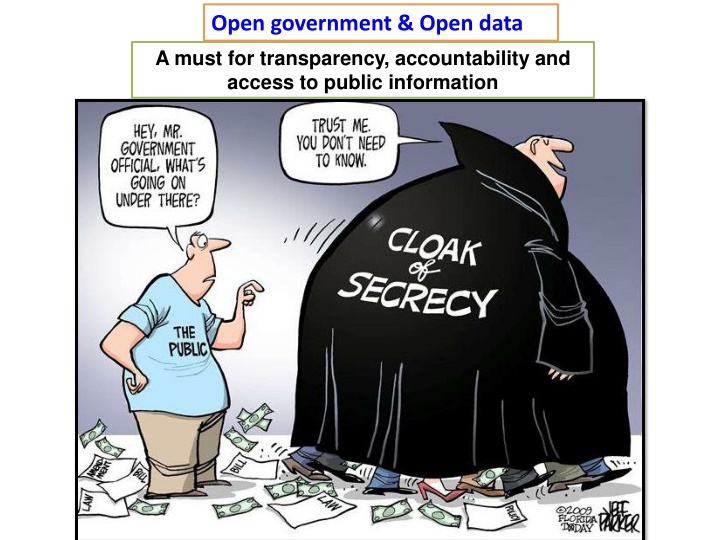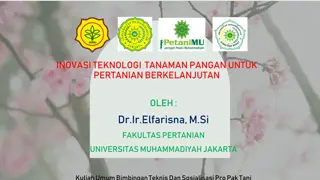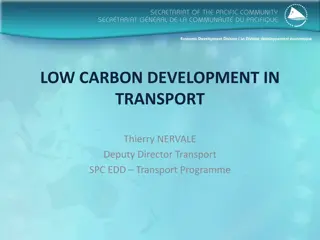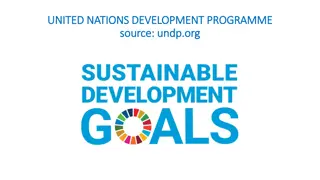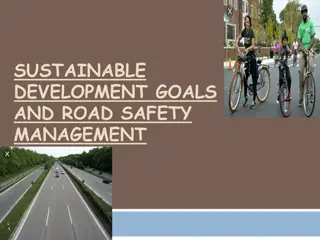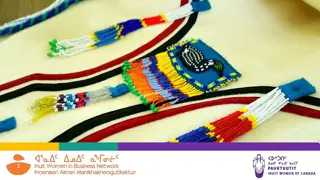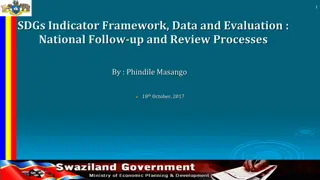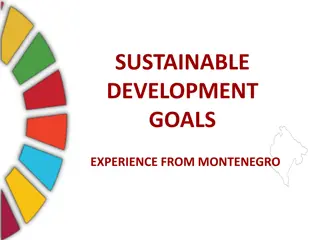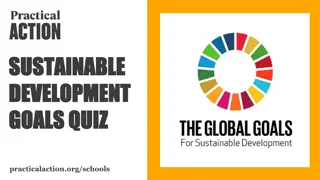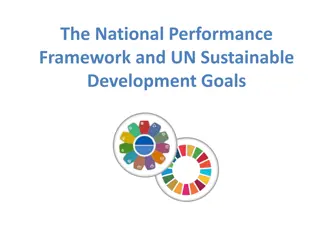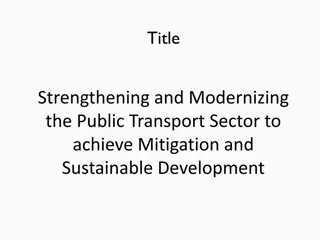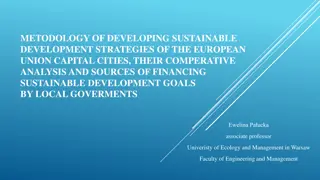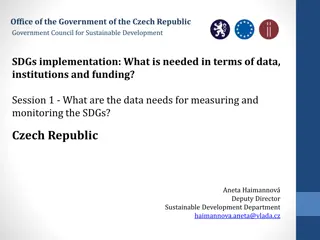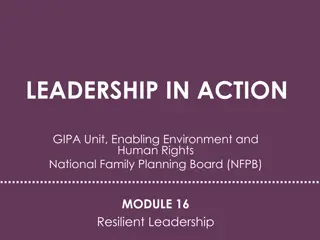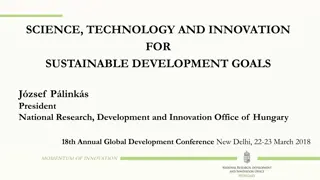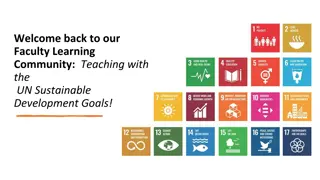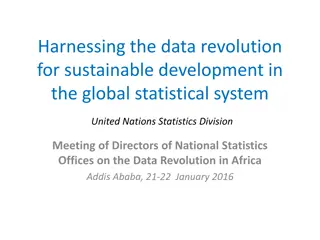Open Government Data and Sustainable Development Goals
Open government data and sustainable development goals go hand in hand, promoting transparency, accountability, and access to public information. Openness in data allows for universal participation, interoperability, and value creation. By striving for sustainable development and embracing open government data, we can achieve inclusive societies, justice for all, and effective institutions across different levels. The benefits of open government data include increased tax revenues, job creation, and improved service efficiency, benefiting both the government and individual users. This approach also opens up new business opportunities and empowers transformation in various sectors.
Download Presentation

Please find below an Image/Link to download the presentation.
The content on the website is provided AS IS for your information and personal use only. It may not be sold, licensed, or shared on other websites without obtaining consent from the author.If you encounter any issues during the download, it is possible that the publisher has removed the file from their server.
You are allowed to download the files provided on this website for personal or commercial use, subject to the condition that they are used lawfully. All files are the property of their respective owners.
The content on the website is provided AS IS for your information and personal use only. It may not be sold, licensed, or shared on other websites without obtaining consent from the author.
E N D
Presentation Transcript
Open government & Open data A must for transparency, accountability and access to public information
We must strive for SUSTAINABLE DEVELOPMENT
Data Openness and Open Data What is Open? Open means anyone can freely access, use, modify, and share for any purpose .. What is open data? Availability & Access Re-Use and Redistribution Universal participation Interoperability
Open Government Data (OGD) What is open Government data? OGD is a philosophy- and increasingly a set of policies - that promotes transparency, accountability and value creation by making government data available to all Anyone to access, freely use or reuse, distribute or re-distribute share without restriction either by technologies or by legal constraints. any royalties or
Open Government Data & Sustainable Development Goals GOAL 16. Promote peaceful and inclusive societies for sustainable development, provide access to justice for all and build effective, accountable and inclusive institutions at all levels. GOAL 17. Strengthen the means of implementation and revitalize the global partnership for sustainable development.
Open Government Data & Sustainable Development Goals and Indicators 16.6 Develop effective, accountable and transparent institutions at all levels. 16.7 Ensure responsive, inclusive, participatory and representative decision-making at all levels. 16.10 Ensure public access to information 17.18 By 2020, enhance capacity-building support to increase significantly the availability of high-quality, timely and reliable data. disaggregated by income, gender, age, race, ethnicity, migratory status, disability, geographic location and other characteristics relevant in national contexts.
Benefits of Open Government Data(OGD) Benefit to government Increased tax revenues Creation of jobs Reduction in data transaction costs Increased service efficiency Increased GDP Benefits for individual users Easier interaction with the government Improved data availability to the researchers Better navigation facilitated by mapping data, databases of points of interest, etc Benefit to private sector New business opportunities Reduced costs for data conversion Better-skilled workforce General Benefits Open data empowering transformation in specific sectors Open data generating new kinds of Public- Private partnership models Data sharing policy Maximizing Use Avoiding duplication Ownership information Better decision-making Benefit to NGOs / civil society Better informed monitoring New avenues for project action: building tools/applications
Data Formats for OGD Data has to be published in open format. It should be machine readable. Though there are many formats suitable to different category of data. Based on current analysis of data formats prevalent in Government it is proposed that data should be published in any of the following formats: CSV (Comma separated Values) XLS (spread sheet- Excel) ODS (Open Document Formats for Spreadsheet) XML (Extensive Markup Language) RDF (Resources Description Framework) KML (Keyhole Markup Language used for Maps) GML (Geography Markup Language) RSS/ATOM (Fast changing data e.g. hourly/daily)
Identification of Resources (Datasets/Apps) and their organization under Catalogs Each department of Govt. has to prepare its confidential List (The datasets which are restricted in nature and are in the interest of the country s security in not opening to the public would fall into the confidential list). All other datasets which do not fall under this confidential list would be in the Open List. These datasets would need to be prioritized into high value datasets and non-high value datasets. All these datasets need to be published on the OGD Platform and high value datasets need to be published as priority base. Government data generated through following processes: 1. Primary Data e.g. Population Census, Education Census, Economic Survey, etc. 2. Processed/Value Added Data e.g. Budget, Planning etc. 3. Data Generated through delivery of Government Services e.g. Free Medicine distribution, Income Tax Collection, Wage distribution etc.
Principles and Criteria of OGD Each department shall have its own criteria for 1. High value datasets 2. Low value datasets Open Government data is governed by following Principles: Completeness Primary Timeliness Ease of Physical and Electronic Access Machine readability Non-discrimination Use of Commonly Owned Standards Licensing Permanence Usage Costs
OGD Initiatives in Developing Countries Kenya In July 2011, Kenya become one of the first African countries and 22nd internationally to launch an Open Data initiative, making over 160 government datasets freely available through a publicly accessible online portal. The portal hosts over four hundred government datasets as well as 2009 census, national and regional expenditure and data on key public services like education, health and agriculture etc
OGD Initiatives in Developing Countries Moldova The Moldova open data website-- the first in the region launched in 2012 with 67 data sets from 5 agencies, with each agency providing a minimum of 3 data sets per month to create a pipeline of data. First country in the World to publish the entire Government expenditure dataset in one consolidated excel file. Chile Chile was among the first few countries in Latin America to adopt open data through a portal. Recently public procurement data has been released to support the initiative. A recent study on judiciary data, including budget allocations, performance statistics, court rulings, selection and removal of magistrates, and hiring and personnel details found Chile at the top of its performance compared to other countries in the region.
5:21 AM 5:21 AM OGD Ranking of Bangladesh (Global Open Data Index) Year Rank Total Countries 75 101 118 2013 2014 2015 45 63 69
Background: A workshop was held on 23 to 25 August, 2015 on the topics of Open Government Data (OGD) Sensitization, Gap Assessment and Strategic planning A Policymakers meeting was held in Bangladesh on Open Government Data (OGD) Last 11, November 2015, presided over by the principal Secretary, Abul Kalam Azad at the Prime Minister's Office. The following committee has been formed to implement/run OGD activities. a)Open data Executive committee headed by Secretary (coordination & reform), Cabinet division. b)Open data Strategy Review and Formulation committee headed by Secretary, SID. c)Open data Working group committee headed by Additional Secretary, SID. d)Open data Implementation committee headed by Project director, a2i.
Open data Current Status: OGD Platform is Developed and beta live. Enhancement of OGD Platform is ongoing for adding new features. OGD Domain is registered under SID. Open Government Data Strategy document (English) is approved by the Minister. Prepared User ID & Passwords for Stakeholders/ Data Providers at OGD platform for Datasets sharing/uploading. Created API at OGD platform to Extract Data From SDG Tracker & National Portal. Started Dataset Collection Process ( One to one meeting with Ministries / Departments) for providing potential Datasets from Affiliated Agencies. Created 12 priority category at OGD Platform Redatam implementation in BBS domain GIS Application in BBS domain BD info in BBS domain Small area Atlas in BBS domain
DATA.GOV.BD Open Government Data (OGD) Strategy Domain : Registration time: January 2016 Name of Organization: Statistics & Informatics Division (SID) data.gov.bd
Metadata Elements for Catalogs and their Description of OGD Metadata Title (Required): A unique name for the metadata (group of resources) viz. Current Population Survey <Year>, Consumer Price Index <Year>, Variety-wise Daily Market Prices Data, State-wise Construction of Deep Tube wells over the years, etc. Description (Required): Provide a detailed description of the catalog e.g., an abstract determining the nature and purpose of the catalog. Keywords (Required): It is a list of terms, separated by commas, describing and indicating at the content of the catalog. Example: rainfall, weather, monthly statistics. Group Name: This is an optional field to provide a Group Name to multiple catalogs in order to show that they may be presented as a group or a set. Sector & Sub-Sector (Required): Choose the sectors(s)/sub-sector(s) those most closely apply(ies) to your catalog. Asset Jurisdiction (Required): This is a required field to identify the exact location or area to which the catalog and resources (dataset/apps) caters to viz. entire country, Division, district, city, etc.
Metadata Elements for Resources and their Description of OGD Resources (Datasets/Apps) Category (Required): Choose from the drop-down options. Is it a Dataset or an Application. Title (Required): A unique name of the resource viz. Consumer Price Index for <Month/Year> etc. Access Method (Required): This could be Upload a Dataset or Single Click Link to Dataset . Reference URLs: This may include description to the study design, instrumentation, implementation, limitations, and appropriate use of the dataset or tool. In the case of multiple documents or URLs, please delimit with commas or enter in separate lines.
Metadata Elements for Resources and their Description of OGD If Resource Category is Dataset Frequency (Required): It mentions the time interval over which the dataset is published on the OGD Platform on a regular interval (one-time, annual, hourly, etc.). Granularity of Data: It mentions the time interval over which the data inside the dataset is collected/ updated on a regular basis (one-time, annual, hourly, etc.). Access Type: It mentions the type of access viz. Open, Priced, Registered Access or Restricted Access (G2G). If Resource Category is App App Type (Required): It mentions the type of App being contributed viz. Web App, Web Service, Mobile App, Web Map Service, RSS, APIs etc. Datasets Used: Datasets used for making this app. Language: Language used for app. Date Released: It mentions the release date of the Dataset/App. Note: It mentions the anymore information the contributor/ controller wishes to provide to the data consumer or about the resource.
Role of Users at OGD Portal 1. Data Provider a) Entry Data. b) Show respective Dashboard & Report c) Send data for Approval 2. Data Approver a) Approve/ Disapprove data b) Show respective Dashboard & Report 3. Data publisher a) Publish data b) Show respective Dashboard & Report
Data Identification Process by the Ministries 1. Prepare Datasets according to guideline a) Analyze the data b) Analyze the rules and Terms. I) prepare its confidential List of datasets. II) prepare its Open List of Datasets. C)Identifying The Data Sets for Upload in OGD Portal 2. Prepare data catalogs(Metadata) for each datasets according to guideline. 3. Upload data to OGD portal.
Open Government: Open Government is a cultural change towards new relationships between governments and citizens. Open Government policies embrace the use of modern ICT and data as resources and tools to create more meaningful interactions between citizens and governments. *Data in 3Ps* Data of the People data by the People data for the People **data for everybody** ** DATA FOR PEOPLE & PLANET ** Our Vision Statement: ***Data for all***
